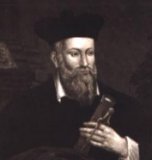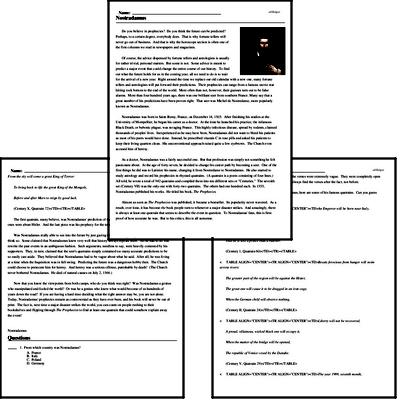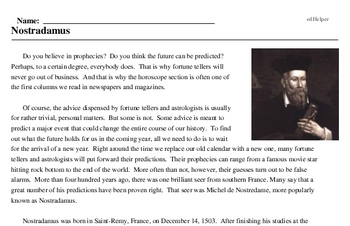Nostradamus
Nostradamus
Reading Comprehension for December 14
Do you believe in prophecies? Do you think the future can be predicted? Perhaps, to a certain degree, everybody does. That is why fortune tellers will never go out of business. And that is why the horoscope section is often one of the first columns we read in newspapers and magazines.
Of course, the advice dispensed by fortune tellers and astrologists is usually for rather trivial, personal matters. But some is not. Some advice is meant to predict a major event that could change the entire course of our history. To find out what the future holds for us in the coming year, all we need to do is to wait for the arrival of a new year. Right around the time we replace our old calendar with a new one, many fortune tellers and astrologists will put forward their predictions. Their prophecies can range from a famous movie star hitting rock bottom to the end of the world. More often than not, however, their guesses turn out to be false alarms. More than four hundred years ago, there was one brilliant seer from southern France. Many say that a great number of his predictions have been proven right. That seer was Michel de Nostredame, more popularly known as Nostradamus.
Nostradamus was born in Saint-Remy, France, on December 14, 1503. After finishing his studies at the University of Montpellier, he began his career as a doctor. At the time he launched his practice, the infamous Black Death, or bubonic plague, was ravaging France. This highly infectious disease, spread by rodents, claimed thousands of peoples' lives. Inexperienced as he may have been, Nostradamus did not want to bleed his patients as most of his peers would have done. Instead, he prescribed vitamin C in rose pills and asked his patients to keep their living quarters clean. His unconventional approach raised quite a few eyebrows. The Church even accused him of heresy.
As a doctor, Nostradamus was a fairly successful one. But that profession was simply not something he felt passionate about. At the age of forty-seven, he decided to change his career path by becoming a seer. One of the first things he did was to Latinize his name, changing it from Nostredame to Nostradamus. He also started to study astrology and record his prophecies in rhymed quatrains. (A quatrain is a poem consisting of four lines.) All told, he wrote a total of 942 quatrains and compiled them into ten different sets or "Centuries." The seventh set (Century VII) was the only one with forty-two quatrains. The others had one hundred each. In 1555, Nostradamus published his works. He titled his book, The Prophecies.
Almost as soon as The Prophecies was published, it became a bestseller. Its popularity never wavered. As a result, over time, it has become the book people turn to whenever a major disaster strikes. And amazingly, there is always at least one quatrain that seems to describe the event in question. To Nostradamus' fans, this is firm proof of how accurate he was. But to his critics, this is all nonsense.
One problem about Nostradamus' quatrains is that the verses were extremely vague. They were completely open for interpretation. Another problem is that people always find the verses after the fact, not before.
Regardless of what you may think of Nostradamus, here are some of his famous quatrains. Can you guess what historical events he predicted?
| An Emperor will be born near Italy, Who will cost the Empire very dearly, They will say, when they see his allies, That he is less a prince than a butcher. |



